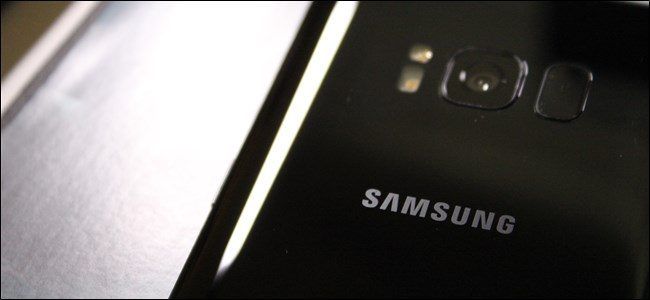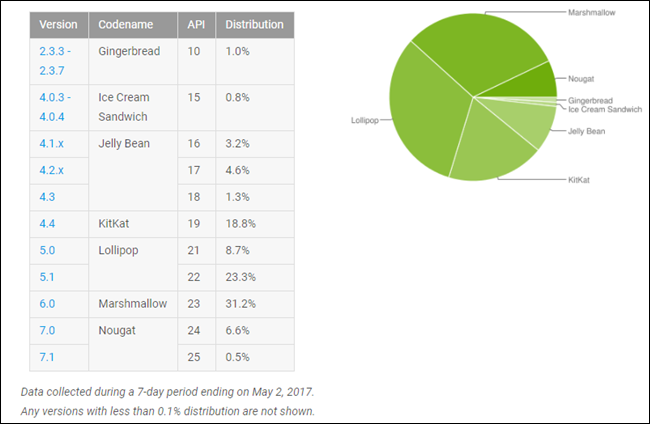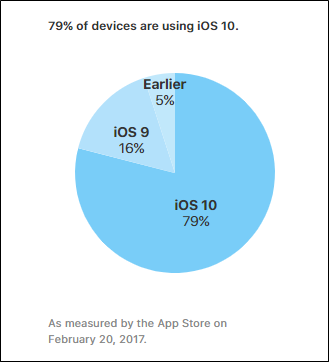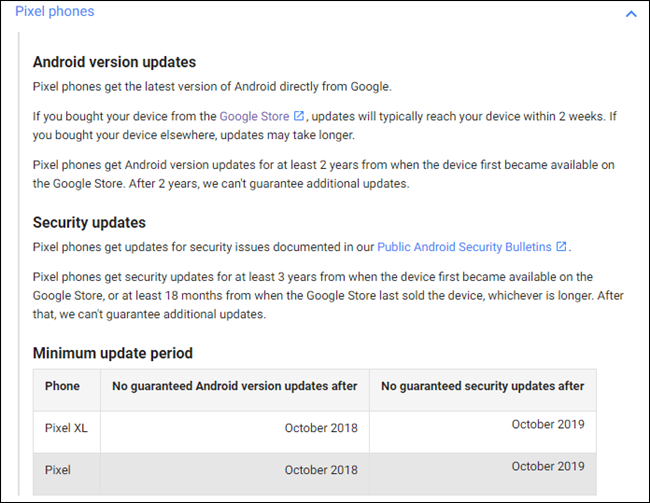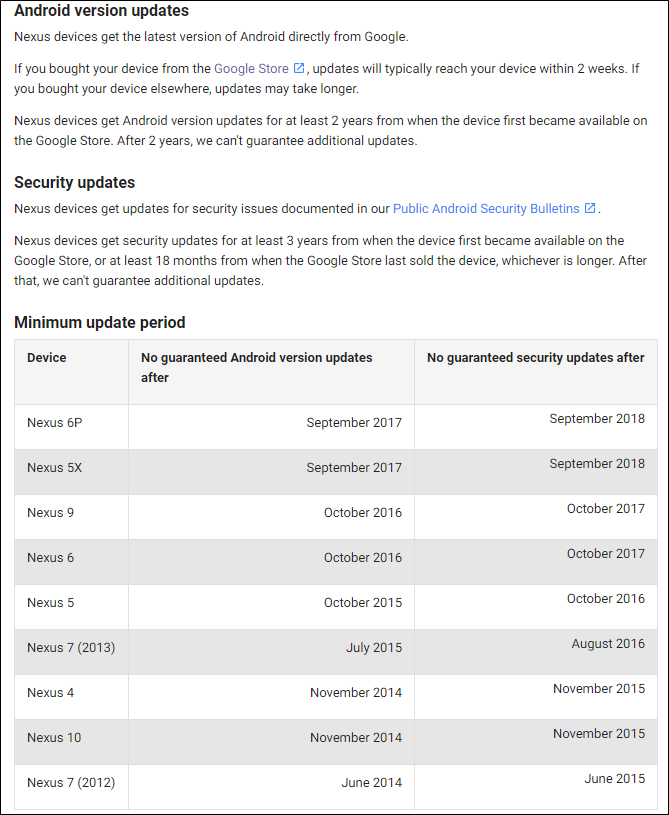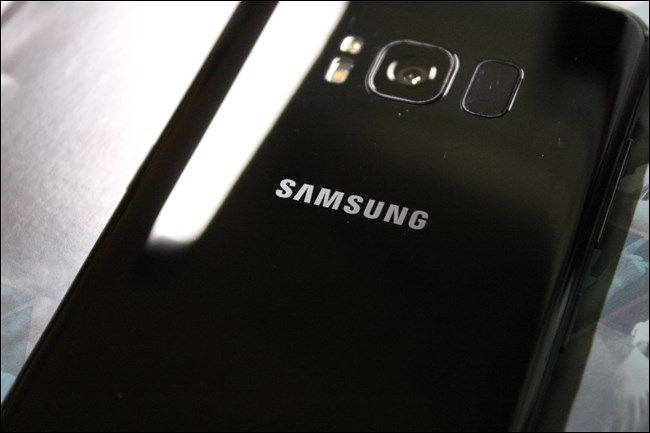It’s 2017, and I still see people criticizing Android for “fragmentation”. This gives Android in general a bad name, and I want to make the facts clear: this isn’t Google or Android's fault. It’s the fault of your manufacturer.
While this has been a talked about issue for some time, a recent piece from Boy Genius Report got me thinking about it---infuriatingly titled "No iPhone user can even imagine dealing with what Android users have to tolerate". I want to set the record straight: this type of thinking isn't just unfair to Android, it's flat out wrong.
What Is Fragmentation?
Basically, when people talk about fragmentation, they’re referring to the spread of Android versions that are still running on devices “in the wild,” because the adoption rate of new version of Android is much slower than that of iOS. It makes sense, really—there are a handful of iPhones, but hundreds of different Android phones, from a variety of manufacturers, and they don't all update to the latest version at the same time.
So, when we talk about Android “fragmentation” as a downside compared to iOS, it suggests that there’s an issue with Android, software development, or the update schedule in general. Articles like the one from Boy Genius Report imply that the issue comes from Google, which isn’t the case. Ever since Google purchased Android, the company has been responsible for pushing updates to the platform. And while it was definitely hit and miss in its infancy, we’ve seen Google take a much more structured approach to OS updates for Android in recent years. In fact, it’s almost clockwork now.
But here we are, still acting like Android has an update issue, when that’s just not the case. The primary argument against Android when it comes to updates is the comparison to Apple and the iPhone. “But nearly 80 percent of iPhones are running the latest version of iOS!” I hear people say. But that’s not an argument at all---unless it's done fairly. Allow me to explain.
Comparing Apples to Apples
Basically, Apple produces the iPhone, as well as iOS. It sends updates directly to the iPhone. Apple is solely responsible for updating its own hardware using its own software. It doesn’t work the same way for Android. If you really want a fair comparison, it’s Google hardware/software versus Apple hardware/software. In other words, it’s Pixel/Nexus versus iPhone.
That’s the only real comparison that can be used fairly—it’s an apples to apples comparison, for lack of a better analogy. Google’s official stance on Nexus and Pixel updates is pretty straightforward: these phones get Android version updates for “at least 2 years from when the device first became available on the Google Store” and security updates "for at least 3 years from when the device first became available on the Google Store, or at least 18 months from when the Google Store last sold the device, whichever is longer.“ That’s straight from Google’s mouth.
That means under the current rules, three generations of Nexus/Pixel devices are being supported by Google: the Nexus 6, 6P, and 5x, as well as the Pixel and Pixel XL. And yes, the Android ecosystem is bigger than that, but those devices are really just alternative options: Google has just as many phone options as Apple does, and they're all kept up to date.
By contrast, Apple is actually less transparent with its update timelines and commitments. Five generations of Apple iPhones are running the latest software (iOS 10): iPhone 5, 5C, 5S, 6, 6 Plus, 6S, 6S Plus, SE, 7, and 7 Plus. The writing is on the wall for the iPhone 5, but at the time of writing it’s still being supported so I’m listing it here and not trusting speculation.
When you break the numbers down and compare the release dates, that means the iPhone 5—which was release in September of 2012—has been actively supported for nearly five years. The Nexus 6, on the other hand, was release two years after the iPhone 5—November of 2014—and is the oldest model supported by Google.
Of course, Apple also “waters down” OS updates on older hardware, so the actual level of support devices receive is arguable there---one might even say it's slightly fragmented, but that's a line I don't think we want to cross here. At least with Google, it’s either full updates or security updates—nothing in between.
That said, in a direct comparison, Apple devices typically have longer support than Nexus or Pixel phones. But this isn’t an argument about who has the best or longest support. It’s about supposed “fragmentation.”
Now, that was a lot of information to load on you at once, and I promise it was for good reason. I needed to paint a clear picture of Google’s Android compared to iOS—that apples to apples thing we talked about earlier.
So, Who Causes "Fragmentation?"
If Google releases updates in such a timely fashion, why are so many recent phones running old versions of Android? Samsung, LG, Huawei, HTC, Motorola, and other manufacturers are the ones to blame for fragmentation, and they should be the ones held accountable.
Basically, when Google finishes a new version of Android, it get shipped off to chip manufacturers (Qualcomm, Samsung, etc.) so they can build drivers. From there, it goes to the OEMs (Samsung, HTC, LG, etc.) so they can add all of bells/whistles/fluff into the OS. Lastly, it has to hit carriers so they can approve the update. While many users like to blame carriers for update issues, that's not where most of the hangup is---it starts with the manufacturers.
Because of Android's open source nature, each manufacturer is allowed to download the source code and add its own features, skins, apps, and more. As a result, it takes most manufacturers much longer to build Android updates for its devices than it does Google. The reason it takes longer is twofold:
- Most manufacturers have a lot of code that has to be added to Android to bring in all these new features, and
- Each manufacturer has multiple devices to develop for.
When it comes to the latter, economics comes into play here: deciding which devices to continually support and how big of a team to dedicate to such a task takes planning. And it takes planning because it costs money. If a phone didn't sell as well as expected, its support isn't going to be that great, because there just isn't as much justifiable money to dedicate.
For example, at some point, Samsung has to decide what sort of lifespan the S7 deserves to have---all while it was planning the S8, as well as continuing to develop for the older platforms like the S6. It's a juggling act, and it takes a lot of time and planning.
But here's the thing: Apple and Google have to do the same thing. And at this point, both have done an exemplary job of providing updates to several devices at the same time. The other Android manufacturers should take note---and this is the primary reason the whole fragmentation talk came to be in the first place. Apple simply makes most Android Manufacturers look bad.
To put that a little more clearly, there is no reason a giant like Samsung can't do the same thing. If Apple and Google can both do it, there's no reason Samsung can't. In fact, Google allows its partners---companies like Samsung---early access to Android's base code so they can actually start developing updates for the various line of phones months before this software is available to the public on Nexus or Pixel phones.
To take things a step further, Google recently announced "Project Treble"---a new effort to streamline the update process at the chip maker level. While it's nice to see Google taking steps towards faster updates, this new program won't really have much bearing on the manufacturers or the carriers---it only streamlines updates for the first step that we talked about earlier. Ars Technica actually has an excellent write-up on Treble, what it means, and why it only addresses a third of Android's update woes.
But yeah, there are no excuses. Android itself isn't fragmented---Samsung is fragmented. HTC is fragmented. LG is fragmented. Motorola is fragmented. But if you're going to compare it to iOS, at least compare it fairly---Google's "iPhones" get updates regularly and for a long time.
Android manufacturers are just lazy and don't take it seriously enough that you purchased their device. If you work for your money, and I'm going to assume you do, and you choose to spend that money on a certain manufacturer's smartphone, then they owe it to you to provide timely and consistent updates. Period.
But, at the same time, if you're still complaining about how your Samsung phone isn't on the latest version of Android, you should have known better. Fool me once, shame on you; fool me for seven years...I should have bought a Pixel. Vote with your wallet. And for the love of all that is holy, stop pretending like Android is inherently inferior to iOS because of fragmentation.
When it comes down to it, Android in its purest form is just like iOS. Much like iPhone users can choose the iPhone or iPhone Plus, Android users only have two real choices to avoid update issues: Pixel or Pixel XL. As much as Android users love choice, I really see this as somewhat of an illusion---the only choice you really have is whether or not to support the manufacturers that don't support you.

